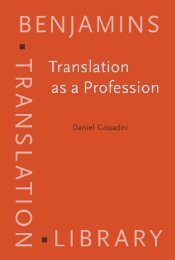Constructing a Sociology of Translation.pdf
Constructing a Sociology of Translation.pdf
Constructing a Sociology of Translation.pdf
- No tags were found...
Create successful ePaper yourself
Turn your PDF publications into a flip-book with our unique Google optimized e-Paper software.
<strong>Constructing</strong> the pr<strong>of</strong>essional field <strong>of</strong> translation 7for translations increases, but also the need for greater specialisation and for cooperationwith the other agents in the communicative act. This greater degree <strong>of</strong>democracy can have both a horizontal and a vertical effect. Horizontally, it affectsthe power balance between cultures and vertically, the access to transcultural informationflows for a wider range <strong>of</strong> people. The process <strong>of</strong> horizontal democratisationis reinforced by the ideological and politically motivated re-evaluation <strong>of</strong>some languages which become symbolic vehicles for ethnic and national identityaffirmation. A current example is the elevation <strong>of</strong> the <strong>of</strong>ficial languages <strong>of</strong> the newEU member states to the status <strong>of</strong> <strong>of</strong>ficial languages <strong>of</strong> the European Union.The vertical democratisation <strong>of</strong> transcultural communication can be achievedwith an old or new lingua franca, if limited financial resources make this necessary.However, the use <strong>of</strong> a lingua franca can be subject to – occasionally completelyunexpected – functional restrictions. Immediately after the disintegration<strong>of</strong> the Soviet Union, Russian ceased to be a lingua franca, for both ideologicaland psychological reasons. At the same time, the seemingly unstoppable rise <strong>of</strong>English was slowed down when the internet, the most international <strong>of</strong> all media,started to use regional languages. This new competition forced the internationalcompanies to adapt their language and culture to the needs <strong>of</strong> the consumers. Evidencefor this development is the rapidly growing number <strong>of</strong> bi- and multilingualwebsites.The internet is the most recent medium for transcultural communication.Its technical parameters determine its extent and structure. Before the development<strong>of</strong> writing, translation as a special type <strong>of</strong> transcultural communication occurredonly in the here and now <strong>of</strong> the communicative act. As writing emergedand made available a complex symbolic system that allowed the recording <strong>of</strong> languageon more permanent media, and as communication beyond the confines <strong>of</strong>interpersonal encounters became possible and the constraints <strong>of</strong> space and timewere overcome, we also see a differentiation <strong>of</strong> translational activity into translatingand interpreting. Interpreting was the translational activity that was still tiedto the spatio-temporal context in which the communicative act was performed,while translators produced artefacts that could be recontextualised in an endlesschain <strong>of</strong> meaning construction. The consequence is that the durability <strong>of</strong> translationsand interpretations differs.The situative and social coordinates <strong>of</strong> interpreting did not change, in theoryuntil the invention <strong>of</strong> the sonograph, in actual fact until the arrival <strong>of</strong> the media <strong>of</strong>mass communication. <strong>Translation</strong>, by contrast, developed along with the mediathat were available for the dissemination <strong>of</strong> texts, and was subject to technical,social and economic constraints. Access to texts on stone, parchment and paperwas limited and the prerogative <strong>of</strong> the rich and powerful. Writing and readingand, thus, also the production and dissemination <strong>of</strong> translations were limited to
















